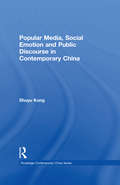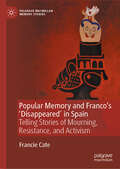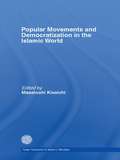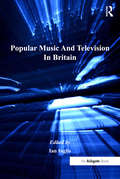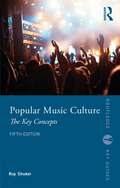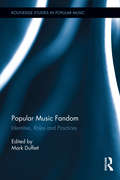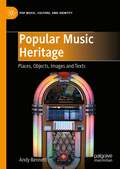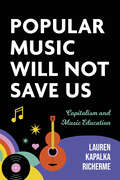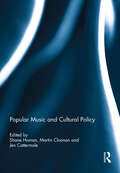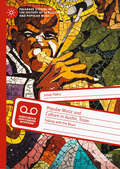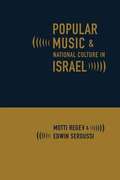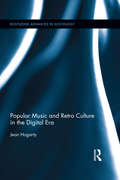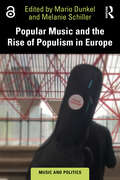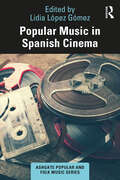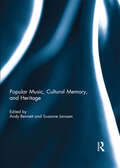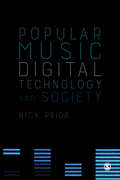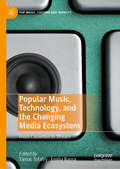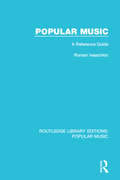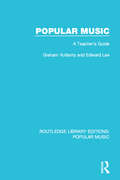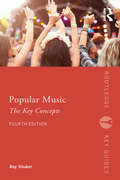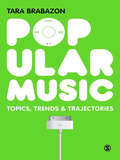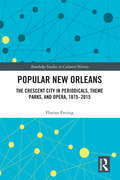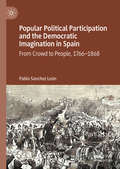- Table View
- List View
Popular Media, Social Emotion and Public Discourse in Contemporary China: Popular Media, Social Emotion And Public Discourse In Contemporary China (Routledge Contemporary China Series)
by Shuyu KongSince the early 1990s the media and cultural fields in China have become increasingly commercialized, resulting in a massive boom in the cultural and entertainment industries. This evolution has also brought about fundamental changes in media behaviour and communication, and the enormous growth of entertainment culture and the extensive penetration of new media into the everyday lives of Chinese people. Against the backdrop of the rapid development of China’s media industry and the huge growth in social media, this book explores the emotional content and public discourse of popular media in contemporary China. It examines the production and consumption of blockbuster films, television dramas, entertainment television shows, and their corresponding online audience responses, and describes the affective articulations generated by cultural and media texts, audiences and social contexts. Crucially, this book focuses on the agency of audiences in consuming these media products, and the affective communications taking place in this process in order to address how and why popular culture and entertainment programs exert so much power over mass audiences in China. Indeed, Shuyu Kong shows how Chinese people have sought to make sense of the dramatic historical changes of the past three decades through their engagement with popular media, and how this process has created a cultural public sphere where social communication and public discourse can be launched and debated in aesthetic and emotional terms. Based on case studies that range from television drama to blockbuster films, and reality television programmes to social media sites, this book will be of great interest to students and scholars of Chinese culture and society, media and communication studies, film studies and television studies.
Popular Memory and Franco's 'Disappeared' in Spain: Telling Stories of Mourning, Resistance, and Activism (Palgrave Macmillan Memory Studies)
by Francie Cate“Francie Cate’s Popular Memory and Franco’s ‘Disappeared’ is an obra magistral, an opus magnum, a masterwork. It is an in-depth and broad study in which further research on memory, imposed forgetting, counter-memory, and the dynamics of cultural memory will be rooted.” – Maureen Tobin Stanley, University of Minnesota Duluth, USA This book examines a "people's history" of the Spanish Civil War's anti-fascists who lost their 1936-1939 fight against far right military insurgents. The book argues that the regime’s “disappeared” have in fact since 1936 been the most visible protagonists safeguarded in the shared collective memory of the war’s losers. Narratives about Franco’s up to 150,000 civilian shooting victims—stories told in the form of memoirs, political speeches, visual art, film, novels, and oral testimonies—form the centerpiece of this study. How have these narratives told by the war’s losers--focused explicitly on the figure of the dead body—been mobilized in periods of political upheaval from 1936 to the present, including WWII; the 1950s and 60s of the Cold War; the 1970s and 80s Spanish Transition; ongoing mass media “culture wars” that have polarized the Right and the Left since public exhumations of unmarked graves began in the year 2000? Through fieldwork in the province of Cádiz, the authorhas also recorded interviews with family members of citizens who were murdered. Through oral narratives, an entire community—violently punished during the years of the dictatorship—succeeded in keeping alive an alternative history of the pre-war enterprise to establish the 1931 Spanish democratic Republic and to build a modern nation bound by constitutional law. The discursive commonalities identified in the wide-ranging testimonies—including pioneering researchers’ publications beginning in the 1970s—constitute a fascinating textual topography of popular cultural memory. This book argues that this treasure trove of storytelling preserved an initially clandestine counter narrative of anti-Francoist resistance, as well as dreams of justice for the dead.
Popular Movements and Democratization in the Islamic World (New Horizons in Islamic Studies)
by Masatoshi KisaichiEver since the terrorist incident of September 11th a general understanding seems to have arisen among people that the challenges posed by Islam have now acquired human and global dimensions. Popular Movements and Democratization in the Islamic World contains case studies of people’s movements in diverse areas and periods, and it seeks to develop a comparative view of Islam and democracy that goes beyond the usual stereotype of Islam being incompatible with democracy. Unravelling the complexities that have arisen between Islam and democracy is the principal task of Islamic scholars, and this book will undoubtedly prove a starting point for all such endeavours. While primarily intended for students and scholars, this timely and important text will prove of interest even to general readers with interests in Islamic studies.
Popular Music And Television In Britain (Ashgate Popular and Folk Music Series)
by Ian InglisListening to popular music and watching television have become the two most common activities for postwar generations in Britain. From the experiences of programmes like Oh Boy! and Juke Box Jury, to the introduction of 24 hour music video channels, the number and variety of television outputs that consistently make use of popular music, and the importance of the small screen as a principal point of contact between audiences and performers are familiar components of contemporary media operation. Yet there have been few attempts to examine the two activities in tandem, to chart their parallel evolution, to explore the associations that unite them, or to consider the increasingly frequent ways in which the production and consumption of TV and music are linked in theory and in practice. This volume provides an invaluable critical analysis of these, and other, topics in newly-written contributions from some of Britain's leading scholars in the disciplines of television and/or popular music studies. Through a concentration on four main areas in which TV organises and presents popular music - history and heritage; performers and performances; comedy and drama; audiences and territories - the book investigates a diverse range of musical genres and styles, factual and fictional programming, historical and geographical demographics, and the constraints of commerce and technology to provide the first systematic account of the place of popular music on British television.
Popular Music Culture: The Key Concepts (Routledge Key Guides)
by Roy ShukerNow in its fifth edition, this popular A–Z student reference book provides a comprehensive survey of key ideas and concepts in popular music culture, examining the social and cultural aspects of popular music. Fully revised with extended coverage of the music industries, sociological concepts and additional references to reading, listening and viewing throughout, the new edition expands on the foundations of popular music culture, tracing the impact of digital technology and changes in the way in which music is created, manufactured, marketed and consumed. The concept of metagenres remains a central part of the book: these are historically, socially, and geographically situated umbrella musical categories, each embracing a wide range of associated genres and subgenres. New or expanded entries include: Charts, Digital music culture, Country music, Education, Ethnicity, Race, Gender, Grime, Heritage, History, Indie, Synth pop, Policy, Punk rock and Streaming. Popular Music Culture: The Key Concepts is an essential reference tool for students studying the social and cultural dimensions of popular music.
Popular Music Fandom: Identities, Roles and Practices (Routledge Studies in Popular Music)
by Mark DuffettThis book explores popular music fandom from a cultural studies perspective that incorporates popular music studies, audience research, and media fandom. The essays draw together recent work on fandom in popular music studies and begin a dialogue with the wider field of media fan research, raising questions about how popular music fandom can be understood as a cultural phenomenon and how much it has changed in light of recent developments. Exploring the topic in this way broaches questions on how to define, theorize, and empirically research popular music fan culture, and how music fandom relates to other roles, practices, and forms of social identity. Fandom itself has been brought center stage by the rise of the internet and an industrial structure aiming to incorporate, systematize, and legitimate dimensions of it as an emotionally-engaged form of consumerism. Once perceived as the pariah practice of an overly attached audience, media fandom has become a standardized industrial subject-position called upon to sell box sets, concert tickets, new television series, and special editions. Meanwhile, recent scholarship has escaped the legacy of interpretations that framed fans as passive, pathological, or defiantly empowered, taking its object seriously as a complex formation of identities, roles, and practices. While popular music studies has examined some forms of identity and audience practice, such as the way that people use music in daily life and listener participation in subcultures, scenes and, tribes, this volume is the first to examine music fans as a specific object of study.
Popular Music Heritage: Places, Objects, Images and Texts (Pop Music, Culture and Identity)
by Andy BennettThis book critically discusses the significance of popular music heritage as a means of remembering and re-presenting rock and pop artists, their music and their place in the culture of contemporary society. Since the mid-1990s, the contribution of popular music to the shaping of contemporary history and heritage has increasingly been acknowledged. In the same period, exhibitions of popular music related artefacts have become more commonplace in museums, and facilities dedicated to the celebration of popular music history and heritage, such as the Rock and Roll Hall of Fame, have opened their doors. Popular music heritage has found other mediums of expression too. There is now a significant popular music heritage media, including books, magazines, films and television series. Fans collect and display their own mementos, while the live performances of tribute bands and classic albums fulfill an increasing desire for the live spectacle of popular music heritage. This book will be crucial reading for established scholars as well as postgraduate and undergraduate students studying popular music heritage.
Popular Music Will Not Save Us: Capitalism and Music Education (Counterpoints: Music and Education)
by Lauren K. RichermeIn today's globalized landscapes, both traditional and progressive K–12 music education practices, including those associated with popular music, can further capitalism-related inequities. In this context, music educators and students might consider how they position themselves and their music-making practices in relation to capitalist aims and processes and confront the more unethical aspects of capitalism.Popular Music Will Not Save Us challenges music educators to rethink their philosophical stances in the face of contemporary capitalist values and explores the intersection of music education and globalized capitalism, unveiling how certain practices exacerbate material inequities and erode social responsibility. As author Lauren Kapalka Richerme unravels the complexities of music education, her analysis sheds light on how prevalent practices can inadvertently uphold capitalist ideals and reinforce individualism, unceasing accumulation, and precarity in the workforce. Given that no musical genre inherently challenges problematic aspects of capitalism, Richerme proposes that music educators instead focus on affective flows, or the circulation of sensations within pedagogical spaces, and consider four alternative positionalities: thriving within, surviving under, resisting, and challenging capitalism.Popular Music Will Not Save Us advocates for a shift away from capitalistic individualism and inequities and toward a more equitable, affective pedagogical mode. Now is the time to transcend traditional boundaries and embrace a new paradigm that prioritizes social impact over commercial gain.
Popular Music and Cultural Policy
by Martin Cloonan Shane Homan Jen CattermolePopular music is increasingly visible in government strategies and policies. While much has been written about the expanding flow of music products and music creativity in emphasising the global nature of popular music, little attention has been paid to the flow of ideas about policy formation and debates between regions and nations. This book examines specific regional and national histories, and the different cultural values placed on popular music. The state emerges as a key site of tension between high and low culture, music as art versus music as commerce, public versus private interests, the right to make noisy art versus the right to a good night’s sleep. The political economy of urban popular music is a strong focus, examining attempts to combine and complement arts and cultural policies with ‘creative city’ and ‘creative industries’ strategies. The Anglophone case studies of policy contexts within in Canada, Britain, the US and Australia reveal how the everyday influence and use of popular music is also about questions of aesthetics, funding and power.This book was originally published as a special issue of The International Journal of Cultural Policy.
Popular Music and Culture in Austin, Texas: Talking with the Blues (Palgrave Studies in the History of Subcultures and Popular Music)
by Josep PedroThis book explores the blues tradition through a collective dialogue with significant musicians and producers of the Austin blues scene. Based on an ethnography in the singular capital of Texas, the self-proclaimed live music capital of the world, it explores the local blues scene through in-depth interviews that reveal intimate bonds between popular music, culture, identity, race, politics, the city and the music industry. Through the voices and experiences of 15 protagonists, readers are introduced to multiple aspects of blues lives, including music-making, style, identity, and the changing landscape of the Austin scene. While this oral history informs about particular biographies, it also delves into larger processes around popular music, culture and race, such as Jim Crow segregation, the Civil Rights era, international touring and gentrification. The book's subtitle assumes an important metaphor in regards to blues artists and the blues: that talking with blues artists is like talking with the blues; that meeting them is a way of meeting the blues. The implication is that blues artists not only form part of the tradition but they also embody the blues tradition with their lives and works, with their music, style, bodies, language, stories, and fashion. Thus, in this scene and book, the interviewees are the blues. Representatives of a contemporary music scene, these musicians and producers generally reveal an eclectic understanding of blues music, with connections to gospel, jazz, rhythm & blues, rock, soul-funk, and hip-hop. The conversations took place between 2010 and 2023, mostly face-to-face in Austin but also online and face-to-face in Madrid (Spain), where some of the musicians have performed. All of the protagonists were followed and observed closely within the everyday reality of the Austin music scene, yet the book also shows how the scene connects with many other places, including Mississippi, Houston, Memphis, New York or Madrid, through the biographies, tours and migrations of the protagonists.
Popular Music and National Culture in Israel
by Motti Regev Edwin SeroussiA scholarly book on popular music's role in the national identity and political culture in Israel.
Popular Music and Retro Culture in the Digital Era (Routledge Advances in Sociology)
by Jean HogartyThis book explores the trend of retro and nostalgia within contemporary popular music culture. Using empirical evidence obtained from a case study of fans’ engagement with older music, the book argues that retro culture is the result of an inseparable mix of cultural and technological changes, namely, the rise of a new generation and cultural mood along with the encouragement of new technologies. Retro culture has become a hot topic in recent years but this is the first time the subject has been explored from an academic perspective and from the fans’ perspective. As such, this book promises to provide concrete answers about why retro culture dominates in contemporary society. For the first time ever, this book provides an empirically grounded theory of popular music, retro culture and its intergenerational audience in the twenty-first century. It will appeal to advanced students of popular music studies, cultural studies, media studies, sociology and music.
Popular Music and the Rise of Populism in Europe (Music and Politics)
by Melanie Schiller Mario DunkelThis book focuses on the role of popular music in the rise of populism in Europe, centring on the music-related processes of sociocultural normalisation and the increasing prevalence of populist discourses in contemporary society. In its innovative combination of approaches drawing from (ethno)musicology, sociology, and political science, as well as media and cultural studies, this book develops a culture-oriented approach to populism. Based on shared research questions, an original theoretical framework and a combination of innovative methodologies that pay attention to the specific socio-historical contexts, taking into account musical material as well as processes of reception, the five chapters in this volume offer detailed analyses of the nexus of popular music and populism in Hungary, Italy, Austria, Sweden and Germany. All of these countries have seen a marked increase in populist parties and discourses over the last years, as well as significant interactions between populism and popular music. This book will be essential reading for those investigating popular music as a crucial aspect in the study of populism as a cultural phenomenon in Europe.The Open Access version of this book, available at http://www.taylorfrancis.com, has been made available under a Creative Commons [Attribution-Non Commercial-No Derivatives (CC-BY-NC-ND)] 4.0 license.
Popular Music in Spanish Cinema (Ashgate Popular and Folk Music Series)
by Lidia López GómezPopular Music in Spanish Cinema analyses the aesthetics and stylistic development of soundtracks from national productions, considering how political instability and cultural diversity in Spain determined the ways of making art and managing culture. As a pioneering study in this field, the chronologically structured approach of this book provides readers with a complete overview of Spanish music and connects it to the complex historical events that conditioned Spanish culture throughout the 20th century to the present day, from the Second Republic, the Spanish Civil war, and the dictatorship through to democracy. The book enables an understanding of the relationships between the recording and film production industries, the construction of collective imagination, the formulation of new stereotypes, semiotic meanings within film music and the musical exchanges between national and international cinema. This volume is an essential read for students and academics in the field of musicology, ethnomusicology and history as well as those interested in the study of diverse musical styles such as copla, zarzuela, flamenco, jazz, foxtrot, pop and rock and how they have been used in Spanish films throughout history.
Popular Music, Cultural Memory, and Heritage
by Andy Bennett and Susanne JanssenPopular music is increasingly being represented and celebrated as an aspect of contemporary cultural history and heritage. In many places across the world, popular music heritage sites – including museums, archives, commemorative plaques adorning buildings, and what could be referred to as DIY music heritage initiatives – constitute some of the key ways in which popular music artists, scenes and events are being remembered. Bringing together a selection of wide-ranging contributions, the purpose of this book is to present a number of case studies from Europe and Australia that demonstrate the variety of ways in which popular music is being cast as cultural heritage and as a medium that invokes the collective memory of successive generations whose identity and sense of cultural belonging have often been indelibly inscribed by the musical soundscapes of their teen and early adult years. This book was originally published as a special issue of Popular Music and Society.
Popular Music, Digital Technology and Society
by Nick PriorFrom shifts in format, through the effects on circulation and ownership, to the rise of digitally-produced genres, the ways we create, share and listen to music have changed fundamentally. In Popular Music, Digital Technology and Society, Nick Prior explores the social, cultural and industrial contexts in which these shifts have taken place. Both accessible and authoritative, the book: Clarifies key concepts such as assemblage, affordance, mediation and musicking and defines new concepts such as playsumption and digital vocalities Considers the impact of music production technologies such as MIDI, sampling, personal computing and smartphone apps Looks at the ways in which the internet shapes musical consumption, from viral marketing to streaming services Examines the effects of mobile audio devices on everyday social interactions Opens up new ways to think and write about the personal experience of making and performing digital music This book is an invaluable resource for anyone who wants to understand the place of popular music in contemporary culture and society. It will be fascinating reading for students and researchers across media and communication studies, sociology, cultural studies and the creative industries.
Popular Music, Digital Technology and Society
by Nick PriorFrom shifts in format, through the effects on circulation and ownership, to the rise of digitally-produced genres, the ways we create, share and listen to music have changed fundamentally. In Popular Music, Digital Technology and Society, Nick Prior explores the social, cultural and industrial contexts in which these shifts have taken place. Both accessible and authoritative, the book: Clarifies key concepts such as assemblage, affordance, mediation and musicking and defines new concepts such as playsumption and digital vocalities Considers the impact of music production technologies such as MIDI, sampling, personal computing and smartphone apps Looks at the ways in which the internet shapes musical consumption, from viral marketing to streaming services Examines the effects of mobile audio devices on everyday social interactions Opens up new ways to think and write about the personal experience of making and performing digital music This book is an invaluable resource for anyone who wants to understand the place of popular music in contemporary culture and society. It will be fascinating reading for students and researchers across media and communication studies, sociology, cultural studies and the creative industries.
Popular Music, Technology, and the Changing Media Ecosystem: From Cassettes to Stream (Pop Music, Culture and Identity)
by Emília Barna Tamas TofalvyThis book explores the relationships between popular music, technology, and the changing media ecosystem. More precisely, it looks at infrastructures and practices of music making and consuming primarily in the post-Napster era of digitization – with some chapters looking back on the technological precursors to digital culture – marked by the emergence of digital tools and platforms such as YouTube or Spotify. The first section provides a critical overview of theories addressing popular music and digital technology, while the second section offers an analysis of the relationship between musical cultures, taste, constructions of authenticity, and technology. The third section offers case studies on the materialities of music consumption from outside the western core of popular music production. The final section reflects on music scenes and the uses and discourses of social media.
Popular Music: A Reference Guide (Routledge Library Editions: Popular Music)
by Roman IwaschkinThis is a comprehensive guide to popular music literature, first published in 1986. Its main focus is on American and British works, but it includes significant works from other countries, making it truly international in scope.
Popular Music: A Teacher's Guide (Routledge Library Editions: Popular Music)
by Edward Lee Graham VulliamyThe approach of this book, first published in 1982, is multi-disciplinary. Popular music, it is argued, is not only a musical but also a social phenomenon; the criteria needed to assess it are different from those used in the appreciation of ‘classical’ music. The first section of this guide is devoted to setting out just what those criteria should be. A second section puts forward bases for course construction that are detailed and flexible. A final section provides a list of further resources.
Popular Music: The Key Concepts
by Roy ShukerNow in an updated fourth edition, this popular A-Z student handbook provides a comprehensive survey of key ideas and concepts in popular music culture. With new and expanded entries on genres and subgenres, the text comprehensively examines the social and cultural aspects of popular music, taking into account the digital music revolution and changes in the way that music is manufactured, marketed and delivered. New and updated entries include: Age and youth Black music Digital music culture K-Pop Mash-ups Philadelphia Soul Pub music Religion and spirituality Remix Southern Soul Streaming Vinyl ? With further reading and listening included throughout, Popular Music: The Key Concepts is an essential reference text for all students studying the social and cultural dimensions of popular music.
Popular Music: Topics, Trends & Trajectories
by Tara Brabazon'An incredibly wide-ranging critical account of popular music. The book is an essential resource for all staff and students in the field' - John Storey, Centre for Research in Media and Cultural Studies, University of Sunderland Organized in accessible sections and covering the main themes of research and teaching it examines: * The key approaches to understanding popular music * The main settings of exchange and consumption * The role of technology in the production of popular music * The main genres of popular music * The key debates of the present day Barbazon writes with verve and penetration. Her approach starts with how most people actually consume music today and transfers this onto the plain of study. The book enables teachers and students to shuffle from one topic to the other whilst providing an unparalleled access the core concepts and issues. As such, it is the perfect study guide for undergraduates located in this exciting and expanding field. Tara Brabazon is Professor of Communication at University of Ontario Institute of Technology (UOIT).
Popular Musical Theatre in London and Berlin
by Len Platt Tobias Becker David Linton Len Platt Tobias BeckerIn the decades before the Second World War, popular musical theatre was one of the most influential forms of entertainment. This is the first book to reconstruct early popular musical theatre as a transnational and highly cosmopolitan industry that included everything from revues and operettas to dance halls and cabaret. Bringing together contributors from Britain and Germany, this collection moves beyond national theatre histories to study Anglo-German relations at a period of intense hostility and rivalry. Chapters frame the entertainment zones of London and Berlin against the wider trading routes of cultural transfer, where empire and transatlantic song and dance produced, perhaps for the first time, a genuinely international culture. Exploring adaptations and translations of works under the influence of political propaganda, this collection will be of interest both to musical theatre enthusiasts and to those interested in the wider history of modernism.
Popular New Orleans: The Crescent City in Periodicals, Theme Parks, and Opera, 1875–2015 (Routledge Studies in Cultural History #95)
by Florian FreitagNew Orleans is unique – which is precisely why there are many Crescent Cities all over the world: for almost 150 years, writers, artists, cultural brokers, and entrepreneurs have drawn on and simultaneously contributed to New Orleans’s fame and popularity by recreating the city in popular media from literature, photographs, and plays to movies, television shows, and theme parks. Addressing students and fans of the city and of popular culture, Popular New Orleans examines three pivotal moments in the history of New Orleans in popular media: the creation of the popular image of the Crescent City during the late nineteenth century in the local-color writings published in Scribner’s Monthly/Century Magazine; the translation of this image into three-dimensional immersive spaces during the twentieth century in Disney’s theme parks and resorts in California, Florida, and Japan; and the radical transformation of this image following Hurricane Katrina in public performances such as Mardi Gras parades and operas. Covering visions of the Crescent City from George W. Cable’s Old Creole Days stories (1873-1876) to Disneyland’s "New Orleans Square" (1966) to Rosalyn Story’s opera Wading Home (2015), Popular New Orleans traces how popular images of New Orleans have changed from exceptional to exemplary.
Popular Political Participation and the Democratic Imagination in Spain: From Crowd to People, 1766-1868
by Pablo Sánchez LeónThis book addresses the changing relationships among political participation, political representation, and popular mobilization in Spain from the 1766 protest in Madrid against the early Bourbon reforms until the citizen revolution of 1868 that first introduced universal suffrage and led to the ousting of the monarchy. Popular Participation and the Democratic Imagination in Spain shows that a notion of the “crowd” internally dividing the concept of “people” existed before the advent of Liberalism, allowing for the enduring subordination of popular participation to representation in politics. In its wider European and colonial American context, the study analyzes semantic changes in a range of cultural spheres, from parliamentary debate to historical narrative and aesthetics. It shows how Liberalism had trouble reproducing the legitimacy of limited suffrage and traces the evolution of an imagination on democracy that would allow for the reconfiguration of an all-encompassing image of the people eventually overcoming representative government.“Focused on the nation and identities, Spanish historiography had a pending debt with that other historical subject of modernity, the people. With this book, Pablo Sánchez León starts cancelling the debt with an innovative methodology combining conceptual history with social and political history. Brilliantly, this books also proposes a novel chronology for modern history and renewed categories of analysis. In many senses, this is an extraordinarily renovating senior work.”—José María Portillo Valdés, University of the Basque Country, Spain “This book by Pablo Sánchez León is an original and detailed study of one of the essential components of modernity, the relation between the concepts of plebe and pueblo. The author shows that plebe and people were shaped in a process of mutual differentiation and how the enduring tension between them deeply marked out the evolution of Spanish politics from the end of the Old Regime and throughout the 19th century. As the author brilliantly argues, such tension is tightly imbricated with the enduring dilemma between representation and participation underlying modern political systems. Through a historical analysis of the influence of people and plebe over Spanish, the book makes clear the degree to which the power of language contributes to shape political actors and institutional frames.”—Miguel Ángel Cabrera — Professor, University of La Laguna, Tenerife, Spain “Most accounts of Spain’s transition to modern democracy begin with the popular uprising against the French invasion in 1808, the creation of a national parliament and the promulgation of an advanced Liberal constitution in 1812. Pablo Sánchez León begins the story half a century earlier in the mass street protests in Madrid and other cities in 1766 sparked by Charles III’s sweeping reform programme. Sánchez León focuses unrepentantly on plebeian groups and crowd action – how they are described and conceived by contemporaries – as a key to understanding Spain’s precocious and troubled passage from absolutism to the promulgation of universal male suffrage in September 1868. This audacious and highly original interpretation will surely strike a chord with students of modern Spain.”—Guy Thomson, University of Warwick, UK “This is a book for exploring (from current needs) the history of political participation in Spanish society in order to rethink the very notion of modern citizenship.”—María Sierra, University of Seville, Spain “Motivated by the current crisis in political representation in parliamentary democracies, this work by Pablo Sánchez León departs from the process of construction of modern citizenship. Representation, participation and mobilization are put into play as an interactive triad whose dynamics and changing conceptualization have the key to the social, political and cultural chang
